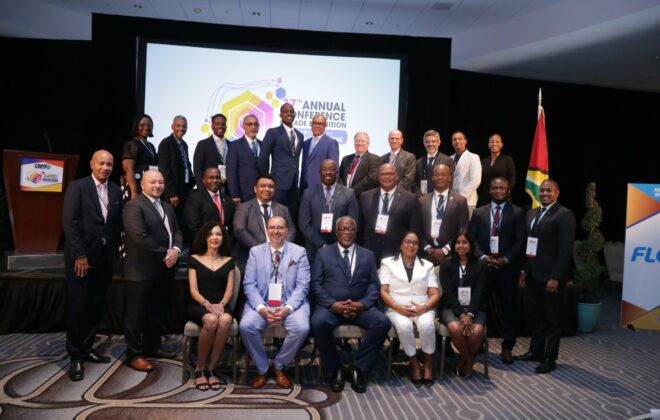CANTO Weekly Newsletter – BNamericas
Thursday, May 24, 2018
| Puerto Rico mulls mobile tax to fund police pay hike – Puerto Rico
ICT: The week in 10 stories – Regional Cuba close to offering internet on mobile phones, says Etecsa – Regional Brief: Ecuador to eliminate telecoms sanctions body – Dominica |
| Our Mission “Influence the innovation and development of ICT solutions for the benefit of members by developing, navigating and leveraging relationships with all stakeholders.” “Advocate for policies, legislation and rules which advance the creation of an environment which facilitates the deployment of services and technologies around the region.” |
| Vision “To become the leading authority in shaping information, communication and technology in the Caribbean Region and the Americas.” |
| Puerto Rico mulls mobile tax to fund police pay hike – Puerto Rico
Puerto Rico is looking at passing a tax on mobile phone lines to help pay for a long-overdue salary increase for the police force and correctional officers, according to local media. The projected US$0.75 monthly tax on every mobile line in the US territory is being considered as part of a “salary increase law” currently under discussion in the lower chamber of the Puerto Rico congress, local newspaper Metro reported. Puerto Rico currently has over 3.4mn mobile lines, according to the country’s telecom regulator, JRTPR. Of those, 2.4mn are post-paid or contract lines, making Puerto Rico an outlier in a region dominated by pre-paid cellphone connections. Based on these figures, the tax could raise around US$30.6mn a year. The law would allow a response to to more than 15 year-ol demand of police officers and members of the corrections department regarding a salary adjustment, local newspaper Hoy stated. The law, known as project 1475, is being sponsored by representative José Luis Rivera, it added. ICT: The week in 10 stories – Regional REGIONAL Virgin Mobile Latin America (VMLA) has denied reports that it is planning to sell its operations in Chile, Colombia and Mexico. The company published a statement in response to a Bloomberg story that cited sources close to supposed talks that VMLA had signed a contract with investment bank BTG Pactual to sell its LatAm operations for an estimated US$300mn. DOMINICAN REPUBLIC The Dominican Republic has halted a tender for Advanced Wireless Services (AWS) spectrum in order to look into allegations that one company already owns the rights to operate those frequencies, telecoms regulator Indotel said in a statement. CHILE Chilean cable operator VTR will take on an administrative role in overseeing the future acquisitions of its parent company Liberty Latin America, including the already announced purchase of Cabletica in Costa Rica, replicating the model of its former parent, Liberty Global in Europe. Chile is open to collaborating with other countries to build a 20,000-24,000km submarine cable connecting the South American country with China, and has already received interest from French Polynesia, according to telecoms watchdog Subtel head Pamela Gidi. This month Motorola Solutions landed a contract to install secure communications systems at Chile’s Minera Collahuasi, the fourth largest copper mine in the world. BNamericas spoke to Jorge Muse, senior account manager with Motorola Solutions Chile, about the particular challenges of installing a reliable communications system in a mine. BRAZIL Finnish telecom equipment manufacturer Nokia will conduct 5G field tests in Brazil this year with at least two telecom operators, the company’s CTO in Brazil, Wilson Cardozo, told BNamericas. The company has already carried out a first trial with TIM for the mitigation of satellite interference using the 3.5GHz bands, the likely candidate for the 5G spectrum in most of the world, Brazil included. MEXICO The Mexican unit of US car manufacturer Ford announced a partnership with popular Israel-based navigation app Waze to allow it to be visualized on the screen of the Ford vehicles’ new-generation Sync 3 infotainment systems, Ford México said in a statement. Slow connections and scant choice of providers are Mexicans’ main barriers to access the internet, according to a study released this week by the country’s internet association, as the Latin American country continues to show solid growth in numbers of internet users. PERU Political uncertainty, corruption scandals and natural disasters affected investor confidence in Peru’s IT sector in 2017, according to consultancy IDC. Investments fell in segments including x-86 servers, corporate storage, PCs and monitors, the consultancy’s studies revealed. IT services, which represent 50% of corporate spending on IT, totaled US$944mn in 2017, less than forecast at the beginning of the year. URUGUAY, ARGENTINA Uruguay and Argentina were the main forces behind the revenue growth of Mercado Libre in the first quarter of the year, with sales rising 90.6% and 79.6% year-on-year in local currency terms, respectively, CFO Pedro Arnt said in an investors call. Other geographies with strong year-on-year revenue growth included Mexico, up 39.1% and Colombia, up 35.5%. In Brazil, growth reached 18.9%, slightly impacted by the hike in shipping costs due to the higher prices charged by Brazil’s shipping and postal service Correios, said the executive. Cuba close to offering internet on mobile phones, says Etecsa – Regional Cuba could soon announce the launch of a mobile internet service in the country via its expanding 3G network, an executive from state operator Etecsa said on the Mesa Redonda local TV show. Tania Velázquez, Etecsa’s business strategy VP, said during the program that the communist-ruled island nation has reached 6.5mn total telephone lines (a 58% telephone penetration) of which 5.2mn are mobile lines. “Etecsa has announced that in 2018 it will start to commercialize the mobile internet service,” Velázquez said. “We have over 1,400 radiobases across the country, of which 520 are transmitting 3G coverage. We expect to announce the date soon.” As a comparison, Telesites, a telecommunications tower company in Mexico and part of billionaire Carlos Slim’s telecoms empire, itself operates over 15,000 towers in Mexico, of which more than 2,800 cover the area of Mexico City and three surrounding states. Cuba appears next-to-last, only ahead of Haiti, in the International Telecommunications Union‘s 2017 ICT Development Index in the Americas, with 35.5 cellphones per 100 inhabitants, 7.5% of households with access to the internet and no mobile broadband connections. Countries across the region are focusing on deployment of 4G technology and networks, and discussing the eventual shutdown of earlier 2G networks. The executive also said that Etecsa has deployed a total of 1,713 public WiFi connectivity areas in Cuba. Brief: Ecuador to eliminate telecoms sanctions body – Dominica Ecuador’s President Lenin Moreno has presented the national assembly with a package of measures to reform telecommunications legislation, which include eliminating telecoms technical supervisory body Supercom. Functions of the Supercom that include imposing sanctions on operators and monitoring international agreements would be passed on to other bodies, such as the ICT promotion council Cordicom. Supercom would be eliminated in 180 days. Internet Day: Access rates across Latin America – Regional Around 72% of Argentines connect to the internet from mobile devices and eight in 10 connect to the internet via fixed and mobile devices every day, according to a survey conducted by the association of internet users for operators Personal and Fibertel. The data were revealed to mark Internet Day, celebrated worldwide on May 17. Of those in Argentina connecting to the internet via mobile devices, 70% do so to use instant messaging services, 67% to watch videos and 46% to play games. The internet access rate in Argentina is higher than in neighboring Brazil, where nearly 65% of the population over 10 years of age accessed the internet in 2016, according to the latest data from Brazilian statistics bureau IBGE. Some 116mn people in Brazil accessed the internet at the end of that year. Almost all (92.4%) made use of messaging applications (other than e-mail), which means that nine out of 10 internet users in the country already used messaging applications in 2016. In Chile and Uruguay, internet penetration rates are higher than in Argentina and Brazil. According to Chilean regulator Subtel, access to the internet via fixed or via mobile (3G and 4G technologies) reached 91 per 100 inhabitants in that country at the end of March 2017, with 80% of accesses made via mobile devices. The recently released survey on internet access and uses, with data from December 2017, showed that 87.4% of Chilean households declared that they had internet access, and 95.1% did so through a mobile phone (more than one answer could be given). In Uruguay, 83% of households had internet access at the end of 2016, compared to 64% in the 2013 survey, 44% in 2010 and 13% in 2006. The data are from the latest specific survey on access and use of information and communication technologies, Eutic. On the other hand, 49% of Peruvians who are over six years of age are internet users, according to data released by the national statistics bureau INEI, also to mark Internet Day. Of those, 32% accessed the web from mobile devices. In Bolivia, internet users comprise 67.5% of the population over 14 years old, according to the telecommunications and transport regulation authority (ATT). Mexican internet users number 71.3mn people, comprising 63.9% of the population aged five or more, according to the latest data from regulator IFT. There, smartphones are the preferred access to the internet for 89.7% (more than one answer could be given). Another study, just released by the Mexican internet society, showed that 79.1mn Mexicans used the internet in 2017, for 67% of people over the age of six. According to an April study from the Inter-American Development Bank (IDB), citing data from the International Telecommunication Union (ITU), average internet access in Latin America is 44%, compared to 81% for the OECD nations. In the Southern Cone, the average is 54%, Central America 34%, Andean nations 34% and the Caribbean 20%. In Latin America, 54% of the population say they have used the internet in the last 12 months, compared to 77% in the OECD. Internet Day is celebrated every May 17 in countries such as Argentina, Bolivia, Chile, Colombia, Ecuador, Mexico, Paraguay, Peru, Spain, Uruguay and Venezuela, promoted by the Association of Internet Users and by the Internet Society The information presented and opinions expressed herein are those of the author and do not necessarily represent the views of CANTO and/or its members
|



